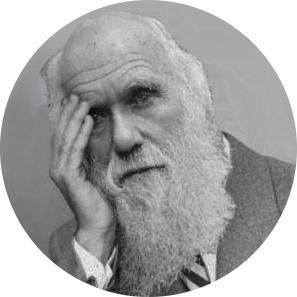Survival of the beautiful
Darwin’s theory of natural selection (and let’s not get into the whole evolution debate again) is well accepted by biologists. Certain physical traits become either more or less common in a population as a function of differential reproduction of their for-bearers. These are the result of changing environments and then certain physical traits are considered preferable to others and those individuals that exhibit them are more likely to survive and prosper.
Those individuals which do not display the particular trait then do not prosper, and are then destined to die out over time. This is termed ‘fitness’. The result of this process is that the particular trait becomes stronger in each successive generation in that particular area which has that particular environment to which that trait is considered beneficial.
Darwin first noticed this particular characteristic among finches on the voyage of the HMS Beagle in 1859. These particular finches were found on the Galápagos Islands. The different environments on the different islands results in 13 distinctive finch species which are closely related but have different beak forms as a result of their different food sources. Modern evolutionary theory has developed from this concept of natural selection and defines fitness not by how long an organism lives, but by how successful it is at reproducing. If an organism lives half as long as others of its species, but has twice as many offspring surviving to adulthood, its genes will become more common in the adult population of the next generation.
If we look at the modern man and the environment we live in, it will be expected that certain physical traits will also develop to help us survive in our particular environment. Much of the differences in physical features found between different racial groups are a result of where our for-bearers lived, and these features are still displayed in our current generations. Whilst racial differences are obvious to any observer, there are perhaps more subtle differences between individuals from certain areas within a larger, defining racial group.
I was observing people in Sandton (a wealthy area just north of Johannesburg, South Africa) and it struck me how many good looking people were about. It has been shown by social science research that good looking people are more likely to get higher paying jobs than unattractive people. That area of Sandton probably has some of the highest average salaries in South Africa, and the work-place is an obvious meeting place for future mating opportunities. It would thus seem obvious that the percentage of attractive people producing offspring from the Sandton area would be higher than areas of lower income groups.
The same trend of accumulation of attractive people could also be found in other areas of the country, the Platinum Mile of Cape Town, Plettenberg Bay (on the Garden Route of South Africa) and Balito (north of Durban on the KwaZulu Coast). These areas are not characterised by higher income earning potential, but as they are highly desirable areas to live only people of considerable wealth can afford to live there. These accumulations of attractive people in certain distinct geographical areas could thus result in new racial groups which would be significantly more attractive than those groups from lower income or less desirable areas. Ultimately this new racial group could consider themselves superior to the unattractive people and isolate themselves completely in their own geographical areas to prevent association and possible mating with unattractive people.
This article was first published on News24 in 2012.
Image Source [darwinfacepalm.tumblr.com/]

I was JUST thinking about this yesterday--how it is that being beautiful has so much impact on opportunity, prosperity, and superiority. I wanted to look at what the evolutionary and biological purposes were behind it. The best thing I could come up with was that "beauty" could be a rudimentary reflection of health and stamina, which are a good percentage of what keep this human race alive.
This is very interesting....
haha - ja - this was written tongue in cheek but some people may actually believe it